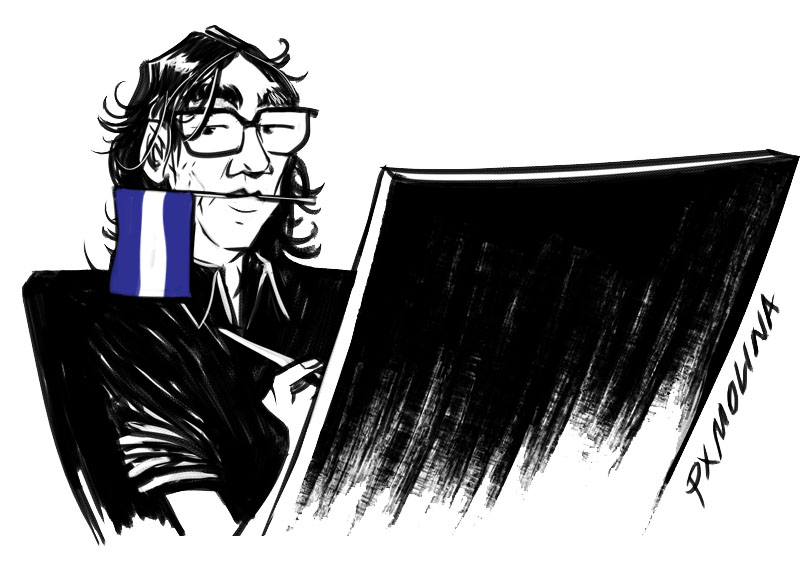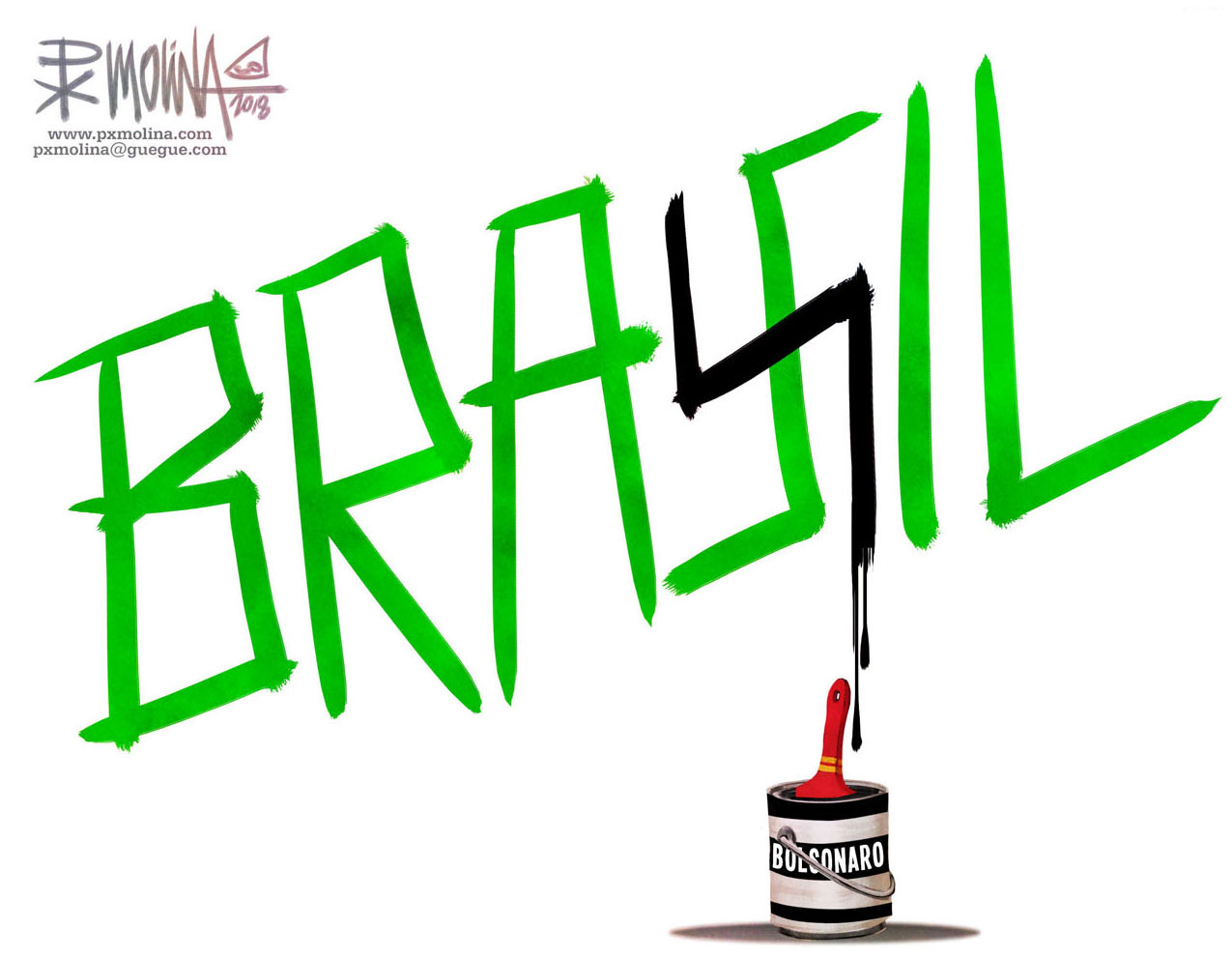During the political crisis that has taken hold in Nicaragua since April 2018, independent journalism and criticism of President Daniel Ortega has stood out as much as it has been targeted by the government. Cartoonist Pedro X. Molina is one of the representatives of this journalism: his striking cartoons tell the stories of resistance from Nicaraguans and explain the acts of violence committed by public agents in an attempt to stifle the protests that erupted in the country a year and a half ago.
But Molina’s cartoons aren’t just about Nicaragua. Published around the world, his illustrations criticize authoritarianism in various latitudes and longitudes and have earned the cartoonist recognitions such as the 2018 Courage in Editorial Cartoon Award from Cartoonists Rights Network International and a 2018 Journalistic Excellence Award from the Inter American Press Association (IAPA).
For over two decades as “one of Nicaragua’s sharpest observers” and offering “a critical view of the relationship between the United States and Latin America,” Molina is one of four professionals to receive the Maria Moors Cabot 2019 award from Columbia University at a ceremony which will be held on Oct. 16. Given since 1938, the award recognizes journalists for their professional excellence and their contribution to inter-American understanding.
The Knight Center talked to the 2019 Cabot Prize winners and debuts this series of interviews with a conversation with Molina. He spoke about his work, the current state of the press in Nicaragua, and the role of his cartoons and independent journalism in a context of repression and authoritarianism.
The interview, which has been translated from Spanish, was lightly edited for clarity.

Knight Center: When and why did you decide to start working as a cartoonist?
Pedro X. Molina: My interest in drawing and criticism began at a young age. I grew up in the Nicaragua of the 80s during the civil war that was actually a reflection of the cold war between the U.S. and the Soviet Union, for that reason Nicaragua had a commercial embargo and it was difficult to get entertainment for children my age, not television, nor print, so the superhero comics for example, was not something I could find in a kiosk, what I DID find were Cuban or South American cartoons and humor magazines and that was what I consumed as a child and aroused my interest in humor and social criticism That is, maybe I would be someone different today if I had grown up reading Superman and not Mafalda. I kept drawing and at university I entered an interuniversity cartoon contest, which I won. By that time I had started to send my drawings to various publications and finally I could start publishing in newspapers, first as a freelancer and then as a cartoonist on staff.
KC: What is your working method? Can you tell us the process of creating a cartoon, from the idea to the publication?
PM: The creative process is not always linear, you can get the perfect idea while having a coffee, before starting work in the morning or after 12 hours of spinning your pencil and your brain. But in an effort to give some order to the chaos, I will say that the first thing I do every day is check the news, review various national and international media and monitor social networks to see what topic or issues are of interest to people for good or bad, then I choose the theme of the cartoon based on the importance of the topic and my personal opinion on it. I start playing with images, words, I write down scribbles ... and once I am clear about the idea, I move to drawing it. I stopped drawing on paper more than a decade ago. Now, because it is more practical in terms of production and distribution, I do it on a digital tablet, but the act of drawing and painting remains the same. The only thing is you don't have to wait for half an hour for your current coat of color to dry to continue working. Once finished, I send it to the editor for publication the next day and start again.

KC: What is the situation of media today in Nicaragua? What do you think is the role that your work has in that context?
PM: Independent journalism is literally a profession of risk in Nicaragua due to the Ortega and Murillo dictatorship. My work is published at Confidencial.com.ni. Our physical newsroom was occupied manu militari by the dictatorship last December, so much of our staff is dispersed in several countries where we continue to produce to keep the media outlet updated.
As a guild in Nicaragua, we have a journalist who was killed by regime forces, journalists put in prison and accused of ‘terrorism’ who were released after about six months in jail, but still face persecution, surveillance and limitations to work, as their media outlet (100% Noticias) was also occupied a week after ours.
Many local radio stations and TV channels have been directly or indirectly closed by the dictatorship, the majority of the radio and televised media that have greater technical scope are in the hands of the presidential couple who have their own children handling them, the two most important newspapers of national circulation were subjected to a paper embargo to suffocate them to the point that one of them (El Nuevo Diario) where I worked for 13 years before quitting to work for Confidencial.com.ni, announced that it closed completely. It was going to be 40 years old.
About 60 independent journalists have gone into exile, which in a country as small as Nicaragua is an important number proportionally speaking. Even so, these journalists, together with those who remain inside Nicaragua, have not stopped denouncing the crimes of the regime and telling what is happening day by day in the national territory.
Ironically, despite this precarious situation, independent journalism has become one of the basic needs of the population. In my case in particular, with the closure of spaces to denounce and protest, not only in the media, but at a general level, where people cannot express themselves, nor march, nor organize, nor sometimes even carry the national flag, criticism and humor has become an escape valve for people, a source of encouragement to resist and persevere in the search for change. People seek to connect with those who, even in the present circumstances, dare to raise their voices and reward them with their attention in the media and social networks.

KC: You were announced as a visiting scholar at the Ithaca College Honors Program in New York. Have you started? What do you think of the experience so far and what are your expectations for the program?
PM: Well, I'm just getting acquainted with my new environment, everything is a challenge, from the logistical issues to the philosophical ones that bring with it an opportunity (and responsibility) as great as this. My expectations are to be able to contribute to the better understanding of what journalistic criticism means from the field of the cartoon of opinion and humor, and the why is as necessary in these times of authoritarianism, fanaticism and the cult of the politically correct. I also hope to learn from the environment of debate offered by the academic environment and that in the end we all win. Of course, I also hope to be able to continue my current work as a proper cartoonist.
KC: As a Latin American cartoonist who illustrates for a global audience, what is the biggest challenge in your work?
PM: In the end, if we look closely, all the problems in the world have similar roots: fanaticism, intolerance, ignorance, selfishness, excessive material ambition and the sense of superiority of some groups over others ... The challenge is finding the most effective ways to deal with a world that has lost its humor, which within its contradictions can send a humorist to the stake for a joke, perhaps misunderstood, while at the same time tolerating and sometimes even celebrating not only expressions but actions from their political leaders that are much worse. It is ironic that in our profession, where our work tools are exaggeration and ridicule we end up now being the voice of logic and reason in societies that no longer seem to obey any.
KC: What is the most important story in the Americas today?
PM: The struggle for freedom beyond ideologies, that is, at least, what interests me most on a personal and Latin American level that has seen horrors committed by people on both the "right" and "left.” Personally, I believe that we must return to the most basic human values, working to build more just systems and for that to try to put decent people in public positions. As basic as that. That weighs more on the political resumé of someone who is consistent, honest, decent, humanist, with sensitivity to people who suffer than the fact that they are of this or that party. Enough with choosing "our scoundrels" so that the "other scoundrels" do not call the shots because in the end ALL these scoundrels are equal, authoritarian, megalomaniac, ignorant and intolerant that end up being executioners of their countries, it doesn't matter if they pull the trigger with the right or the left.
KC: For you, what is the significance of receiving the Maria Moors Cabot Prize?

PM: As a member of independent journalism in Nicaragua, I see this award as recognition not only of me, but also to that brave journalism as a whole. Devoted colleagues who, under bullets, threats, from jail, secrecy or exile have fought and continue to fight to inform people, to make them think and to demand those freedoms to which we are all entitled, whether or not we are journalists. To all of them, the veterans and the young, I thank you for being a constant inspiration for my work.
As a cartoonist, I also thank and acknowledge the jury of Columbia University for giving due importance now more than ever to a journalistic genre as necessary as the cartoon of opinion. A genre in danger lately because of authoritarianism, but also because of the myopia of some timid editors, fans of the politically correct and hordes of digital lynching. However, there it is facing the music and trying to put a smile on our faces and a thought in our heads that helps us to question and improve our reality.